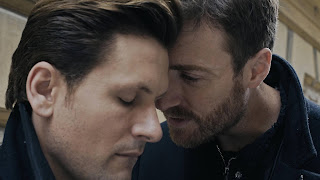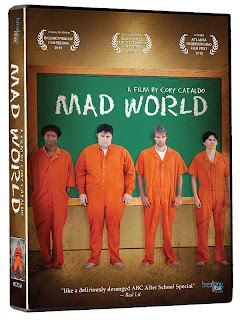Movie Review - Procession (2021)
This film by Robert Greene is doing something a little different. This film focuses on six men who are the survivors of sexual abuse as children in the Catholic diocese in Kansas City, Missouri. These men are all over the hill and would be considered middle-aged, meaning their abuse happened decades ago in the 1970's or 80's. For some, if not most of them, the statue of limitation has run out, so seeking justice isn't even on the table. Instead, this film is intending to be a kind of art therapy or some kind of emotional catharsis for those six men. How it does so is by having the six men participate in the filmmaking process itself.
Two films that came to mind was Kirsten Johnson's Dick Johnson Is Dead (2020) and Joshua Oppenheimer's The Act of Killing (2013). They're both documentaries where the subject or subjects participated in the filmmaking process. The extent in both Johnson and Oppenheimer's films is that their subjects were merely actors in reenactments or fantasy sequences in addition to their being interviewed and profiled as any subject would. Here, Greene's subjects are more than just actors. Greene's subjects could be credited as the directors here, along with Greene himself. Greene's subjects could also be credited as writers as well.Those subjects include Dan Laurine, a survivor who is himself a filmmaker. There's also Mike Foreman who does home repair, Michael Sandridge who is an interior designer, Ed Gavagan who seems to be in real estate and Tom Viviano who says he's 62, so he might be retired if not close to it. Finally, there's Joe Eldred who states that three priests abused him. One of whom raped him. He's distinctive in that he's the only one wearing glasses and with a bald head. Yet, he's also the only one with a prosthetic leg. Eldred is missing the lower part of his right leg. It's never explained why or when it happened, but the film never really profiles these six men, delving deeply into their lives. Laurine mentions having a wife and we see her briefly at the end, but we don't really get much of their personal or social lives beyond that. Laurine has scenes with his brother, but only because Laurine's brother was also a survivor.
The film is instead focused on the art therapy with which the six men are engaged. That art therapy is the six men coming together and making a series of scenes for this film that depict their experiences leading into the sexual abuse they suffered. One scene involves a nightmare that one of the survivors had. One scene is a fantasy where one survivor gets to express something he wanted to do but never got the chance. The final scene involves the dramatizing of one survivor writing a letter to his younger self. We see those scenes, not always in total, but we also see the behind-the-camera production of the six men making those scenes. The men act as the writers, but also the actors and the directors. Each man writes his own scene and then practically is the one directing that scene.Terrick Trobough is the young actor who is cast to play each of the six men in each of the scenes they create. It's interesting to see the conversations that are had about them doing these scenes with this boy. It's also interesting to see the care that they have almost at every turn with making sure the boy and his parents are okay with the material. I was mixed though on this film after we get scene after scene of these men reliving their most traumatic moments and then watching them inevitably break down and cry. The one exception is Foreman who actually explodes in anger in the production of his scene. However, the point is to be catharsis for these men, so if nothing else, it accomplishes what it set out to do.
Rated R for language.
Running Time: 1 hr. and 58 mins.
Available on Netflix.













Comments
Post a Comment